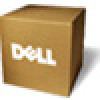Dell Broadcom NetXtreme Family of Adapters Broadcom NetXtreme 57XX User Guide - Page 23
Installing the DOS NDIS2 Driver Software on the Hard Disk
 |
View all Dell Broadcom NetXtreme Family of Adapters manuals
Add to My Manuals
Save this manual to your list of manuals |
Page 23 highlights
workgroup=WORKGROUP reconnect=yes dospophotkey=N lmlogon=0 logondomain= preferredredir=basic autostart=basic maxconnections=8 [network drivers] netcard=B57.dos transport=ndishlp.sys,*netbeui devdir=A:\NET LoadRMDrivers=yes 3. Copy B57.dos to A:\Net. 4. Create the appropriate Autoexec.bat file in drive A for the chosen protocol as shown below. For TCP/IP path=a:\net a:\net\net initialize a:\net\netbind.com a:\net\umb.com a:\net\tcptsr.exe a:\net\tinyrfc.exe a:\net\nmtsr.exe a:\net\emsbfr.exe a:\net\net start basic net use z: \\SERVERNAME\SHARENAME For IPX SET PATH=A:\NET A:\NET\net initialize A:\NET\nwlink A:\NET\NET START BASIC net use z: \\SERVERNAME\SHARENAME For NetBEUI SET PATH=A:\NET A:\NET\NET START BASIC net use z: \\SERVERNAME\SHARENAME 5. Create a Config.sys file on the startup disk in drive A as shown below. files=30 device=a:\net\ifshlp.sys lastdrive=z Installing the DOS NDIS2 Driver Software on the Hard Disk To install the DOS NDIS2 Driver Software on the hard disk 1. Verify that the system has Microsoft LAN Manager 2.2 installed, with a protocol such as NetBEUI configured. 2. Create a folder on your hard disk to store the NDIS 2.01 driver. Example: C:\LANMAN 3. Copy the B57.dos file to this folder. 4. Edit the Config.sys file by adding the following lines: DEVICE = C:\LANMAN\PROTMAN.DOS DEVICE = C:\LANMAN\B57.DOS DEVICE = C:\LANMAN\NETBEUI.DOS 5. Edit the Autoexec.bat file by adding the following lines: C:\LANMAN\NETBIND.EXE C:\LANMAN\NET START WORKSTATION C:\LANMAN\NET USE drive letter: \\server name\resource name 6. Edit the Protocol.ini file (located in C:\LANMAN) to configure the driver to bind with NetBEUI or any other protocols. Example: [PROTOCOL MANAGER] DriverName = PROTMAN$ [NETBEUI_XIF] DriverName = netbeui$ BINDINGS = B57 [B57] DriverName = "B57$" 7. Restart the computer to complete the installation. NOTE: The driver loads during system configuration and displays the Broadcom banner, controller name, MAC















